Programs to Ensure International Applicability
Expertise in veterinary medicine is required to prevent the outbreak and spread of zoonotic diseases-diseases that occur worldwide irrespective of national borders-and transboundary animal diseases-diseases that cause major socioeconomic losses to affected countries. Areas that demand veterinary expertise also include those of global ecosystem conservation, living environment protection, food safety and biosecurity measures in relation to the import and export of livestock products. Additionally, a global change in views on the lives of companion animals has enhanced the need for advanced veterinary care. In this way, veterinary expertise is needed in a wide variety of fields, and the development of veterinarians, in particular, who can work globally within an international framework (namely, international veterinary professionals) requires the internationalization of education aimed at fostering globally minded veterinarians through internationally applicable programs.
The Hokkaido University School of Veterinary Medicine and the Obihiro University of Agriculture and Veterinary Medicine in 2012 launched the Cooperative Veterinary Education Program that leverages the strengths and characteristics of the respective universities, and have since worked to build a veterinary educational system with a curriculum rigorous enough to rank with veterinary colleges in Europe and the United States in order to ensure quality assurance based on European Association of Establishments for Veterinary Education (EAEVE) accreditation. This initiative was selected for funding by the Subsidy for the Enhancement and Promotion of National University Reform as the Program for the Establishment of a European- and American-class Collaborative Veterinary Education Platform by Veterinary Colleges of Four National Universities (2012-2017). Based on the achievements made under the program, the International Vet Exchange Program (IVEP) aims to foster the development of veterinarians capable of contributing to the resolution of global issues through (1) further enhancement of the educational functions of the Cooperative Veterinary Education Program and (2) internationalization of education in collaboration with overseas veterinary colleges on four continents.
The IVEP equips students with world-class day-one competencies-the knowledge and skills new veterinary graduates need to have on day one when entering the veterinary profession-through internationally applicable veterinary education programs that are offered by further strengthening the functions of the Cooperative Veterinary Education Program. To be specific, in consideration of animal welfare and for the enhancement of undergraduate clinical training, the IVEP will upgrade the skills laboratory with manikins and simulators for undergraduate clinical training and audiovisual and other forms of educational content, as well as stepping up general clinical training, including 24-hour and nighttime emergency medical care. The IVEP will also enhance education on veterinary care for exotic animals in collaboration with the Sapporo City Maruyama Zoo while working with the Sapporo City Animal Welfare & Management Center to strengthen education on animal welfare and protection through the introduction and utilization of the concept of shelter medicine. Experiences and know-how in the building and reinforcing of such an internationally applicable educational system will be tapped to strengthen the veterinary education and assessment system in Japan.
Simulators
Blood drawing training
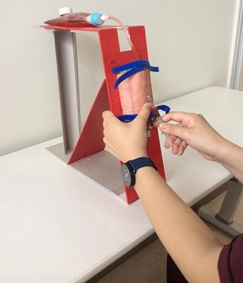
Students draw artificial blood from a simulated blood vessel (tube).
Suturing training
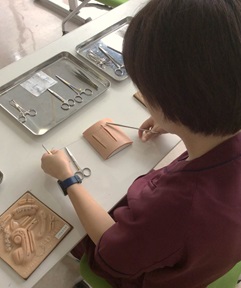
Students carry out suturing training using a surgical suture needle, thread, scissors and needle holder.
Cardiopulmonary resuscitation (CPR) training
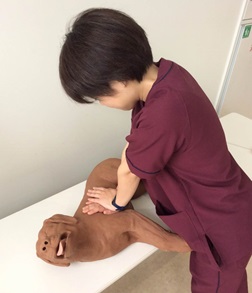
This manikin allows training in artificial respiration, cardiac massage and pulse taking. The student lays their palm over the manikin's heart and rhythmically compresses the chest.
Endoscopy training
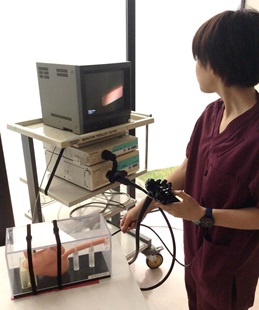
This canine upper gastrointestinal model allows students to pass an endoscope into the esophagus, stomach and duodenum.
Rope halter training
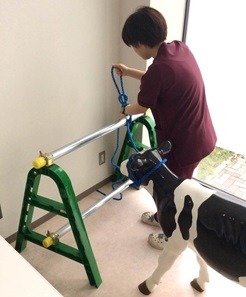
Students practice how to tie a cow to a treatment stall using a single rope.
- International Vet Exchange Program (IVEP)
- Overseas Training to Develop a Global Mindset
- Programs to Ensure International Applicability
